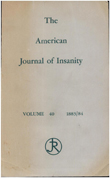Effect of previous trauma on acute plasma cortisol level following rape
Abstract
OBJECTIVE: The authors examined the relationships among history of previous assault, severity of rape, acute plasma cortisol level after rape, and development of rape-related post-traumatic stress disorder (PTSD). METHOD: Blood samples were drawn from 37 adult female rape victims within 51 hours after they had been raped. The subjects were assessed for history of previous assault and for the presence of PTSD 17-157 days (mean = 90 days) after the rape. RESULTS: Women with a history of previous assault had a lower mean acute cortisol level after the rape but a higher probability of subsequently developing PTSD. A significant interaction between history of previous assault and the severity of the index rape was observed: only women who had never been assaulted before had higher cortisol levels following high-severity rapes (those which included injury or multiple types of penetration) than low-severity rapes. CONCLUSIONS: The authors conclude that previous traumatization may attenuate the acute cortisol response to trauma.
Access content
To read the fulltext, please use one of the options below to sign in or purchase access.- Personal login
- Institutional Login
- Sign in via OpenAthens
- Register for access
-
Please login/register if you wish to pair your device and check access availability.
Not a subscriber?
PsychiatryOnline subscription options offer access to the DSM-5 library, books, journals, CME, and patient resources. This all-in-one virtual library provides psychiatrists and mental health professionals with key resources for diagnosis, treatment, research, and professional development.
Need more help? PsychiatryOnline Customer Service may be reached by emailing [email protected] or by calling 800-368-5777 (in the U.S.) or 703-907-7322 (outside the U.S.).



